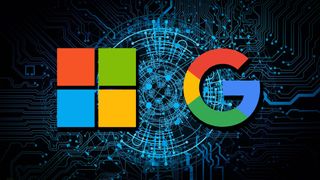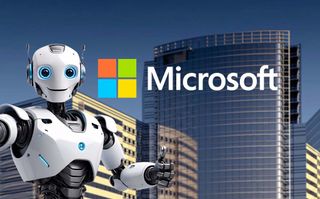"We are multiple years behind the competition in terms of ML scale," emails show Microsoft executives were worried about rival Google's AI development, which motivated them to invest in OpenAI
Emails sent between Microsoft executives in 2019 have been made public as part of an antitrust case.

What you need to know
- Emails from 2019 between Microsoft executives Bill Gates, Satya Nadella, and Kevin Scott, were made public as part of an ongoing antitrust case.
- These emails specifically discuss worries that Microsoft's AI was "multiple years behind" key rival Google's AI.
- After these emails were sent, Microsoft went on to invest in OpenAI, which has helped the company improve its own AI developments.
- Today, Microsoft Copilot, an AI program, is integrated into various Microsoft software to provide AI assistance in various ways.
Considering Microsoft's current artificial intelligence (AI) focus, it's strange to think back to a time when the company wasn't in such a good place with it. But recently, information has come to light that helps explain why the tech company struck a deal with OpenAI in 2019.
As part of an ongoing antitrust case, heavily redacted emails sent between Microsoft executives in 2019 were made public recently. The subject of these emails — concerns that Microsoft's AI developments were falling behind that of one of its biggest competitors, Google.
Specifically, CTO Kevin Scott wrote to CEO Satya Nadella and co-founder Bill Gates to talk about Microsoft's current AI situation. The email discussed worries that Microsoft's machine learning (ML) developments were "multiple years behind the competition."
"We have very smart ML people in Bind, in the vision team, and in the speech team. But the core deep learning teams within each of these bigger teams are very small, and their ambitions have also been constrained, which means that even as we start to feed them resources, they still have to go through a learning process to scale up. And we are multiple years behind the competition in terms of ML scale." - Kevin Scott email from June 12, 2019
Scott also mentioned that he initially didn't pay much attention to AI but realized this had been a bad move since Microsoft's rivals were making great strides with it.

It's clear that the Microsoft execs took this information seriously. Later that year, Microsoft went on to strike a deal with OpenAI in 2019 and this has helped the company within the AI realm quite a bit since then. As of today, Microsoft has invested more than $13 billion in OpenAI (thanks, The Verge). You likely already know this, but to reiterate, OpenAI has been able to create multiple AI tools including the popular chatbot, ChatGPT, and the upcoming text-to-video generative model, Sora.

- Best AI PCs
- Best AI Chatbots
- Best AI image generators
- Microsoft is the most valuable company
It's interesting to see that Microsoft recognized it needed to do something to increase its standing within the AI realm and made a very good move to maintain its competitive place. We've seen how much AI programs like ChatGPT, DALL-E, Midjourney, and others have grown in popularity over the last few years. AI will only continue to grow and become more integrated with everyday programs as time goes on, so Microsoft made a smart move when making that deal with OpenAI in 2019.
Get the Windows Central Newsletter
All the latest news, reviews, and guides for Windows and Xbox diehards.
These days Microsoft's AI assistant, Copilot, is capable of generating text responses to prompts as well as generating images (through the help of DALL-E 3). It's available within various Microsoft programs and services. Not to mention, it's been integrated into the Bing search engine for faster and more useful search results.
Since these emails were sent in 2019, Microsoft co-founder Bill Gates has officially stepped down from the company. However, he still remains involved. After all, the man helped found the company when he was 20 (back in 1975). It's been his life's work and a very successful company to boot. So it makes sense he would continue to provide some input even if the now, 68-year-old retiree has reduced his focus on it.

Self-professed gaming geek, Rebecca Spear, is one of Windows Central's editors and reviewers with a focus on gaming handhelds, PC gaming, and laptops. When she isn't checking out the latest games on Xbox Game Pass, PC, ROG Ally, or Steam Deck; she can be found digital drawing with a Wacom tablet. She's written thousands of articles with everything from editorials, reviews, previews, features, previews, and hardware reviews over the last few years. If you need information about anything gaming-related, her articles can help you out. She also loves testing game accessories and any new tech on the market. You can follow her @rrspear on X (formerly Twitter).
